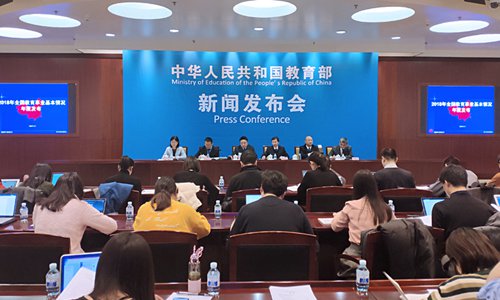
The press conference of China’s Ministry of Education on Tuesday. (Photo: Ministry of Education of the People’s Republic of China)
China will open around 400 majors related to big data, artificial intelligence (AI) and robotics in universities in 2019, China's Ministry of Education (MOE) announced on Tuesday.
Another 612 new engineering research projects will also be implemented in universities."AI and big data are newly established majors and will be taught in some directions like computer application technology, information and communication, control science and engineering," Fan Hailin, a deputy director of MOE's Department of Higher Education, told the Global Times on Tuesday.
China has set the target becoming a major center for AI innovation and world leader in AI technology and applications by 2030, the Xinhua News Agency reported.
"New courses of some less commonly taught languages of the countries along the routes of the Belt and Road Initiative, including Belarusian, Kurdish, Maori, Bislama and Dhivehi, will also be open in some universities," Fan said.
Beijing Foreign Studies University and Shanghai International Studies University, China's two leading language universities, have added 11 less commonly taught language majors including Kurdish, Maori, Tongan, Samoan and Comorian, and Uzbek major respectively to undergraduates in 2018. Most of them were languages of countries participating in the initiative.
At the conference, the ministry also vowed to continue promoting online courses (MOOC) in 2019. Specifically, MOE said it will help train at least 10,000 science teachers through the platform. Currently, the ministry has announced 1,291 MOOCs. The universities and colleges that opened online courses included top-notch Peking University and vocational schools like the Nanjing Institute of Industry Technology. The subjects vary greatly from traditional science subjects such as physics and chemistry to those of profound cultural essence such as the analysis of Chinese literature masterpiece "Dream of the Red Chamber" and ancient medical classic "Yellow Emperor's Inner Canon."
Some new majors in medical sciences including precision medicine and translational medicine and intelligent medicine have been established, and 74 university affiliated hospitals have been approved as the first national clinical teaching and training demonstration centers.
Some new majors in medical sciences including precision medicine and translational medicine and intelligent medicine have been established, and 74 university affiliated hospitals have been approved as the first national clinical teaching and training demonstration centers.
China has built the world's largest higher education system. The number of undergraduate colleges has reached 1,245 and the total number of undergraduate students is 28.31 million. The gross enrollment rate of higher education has reached 48 percent, according to the conference.


